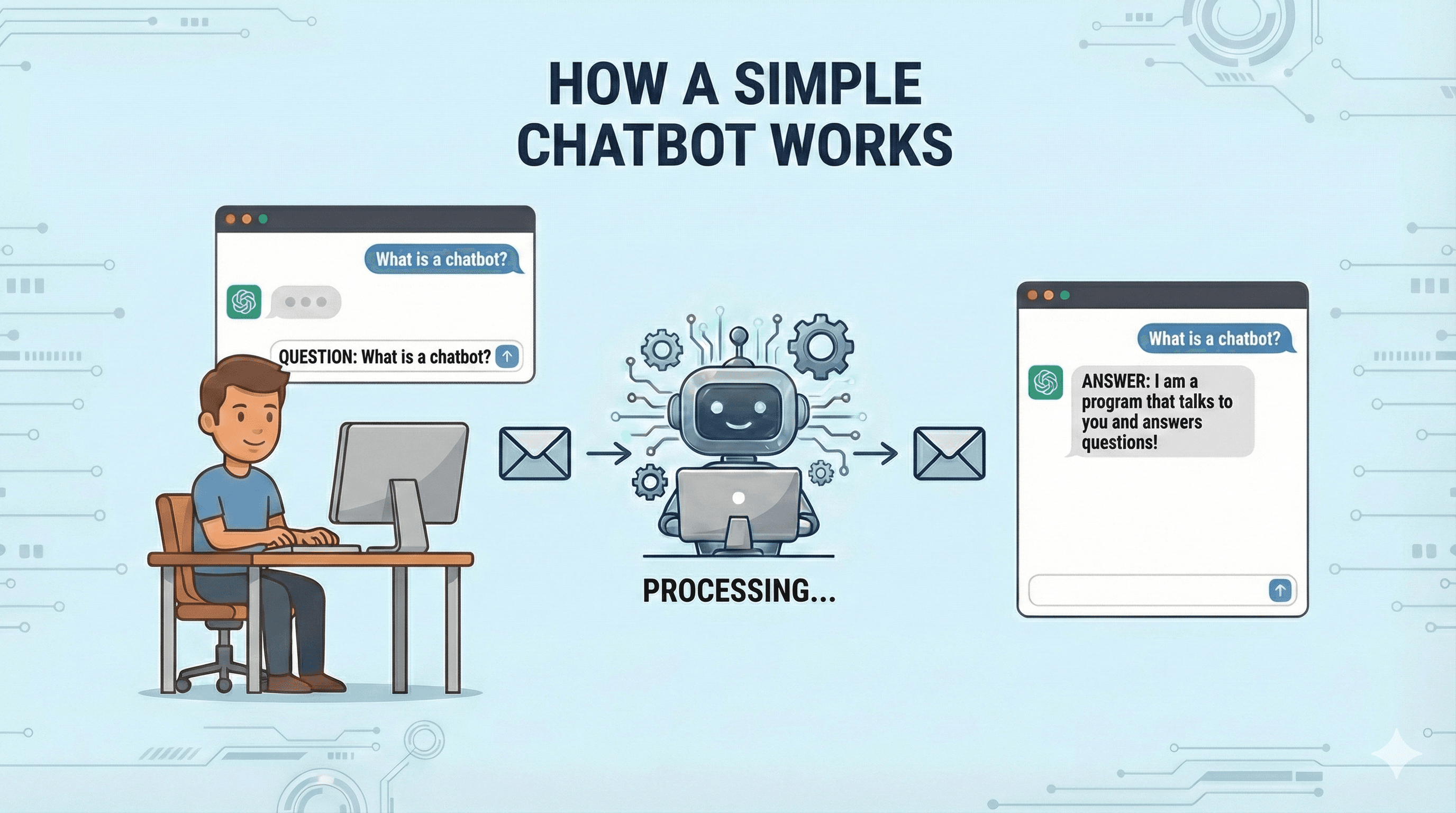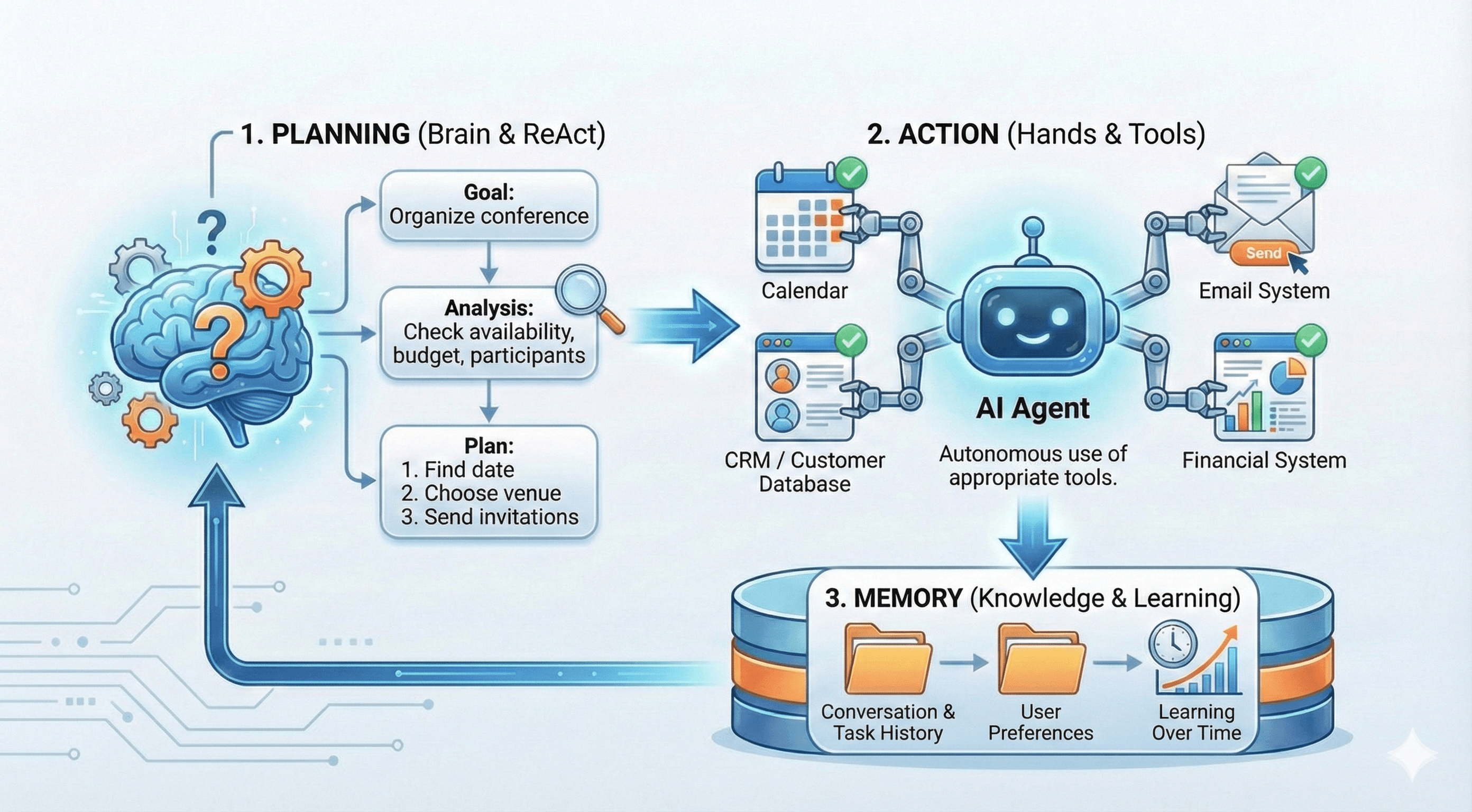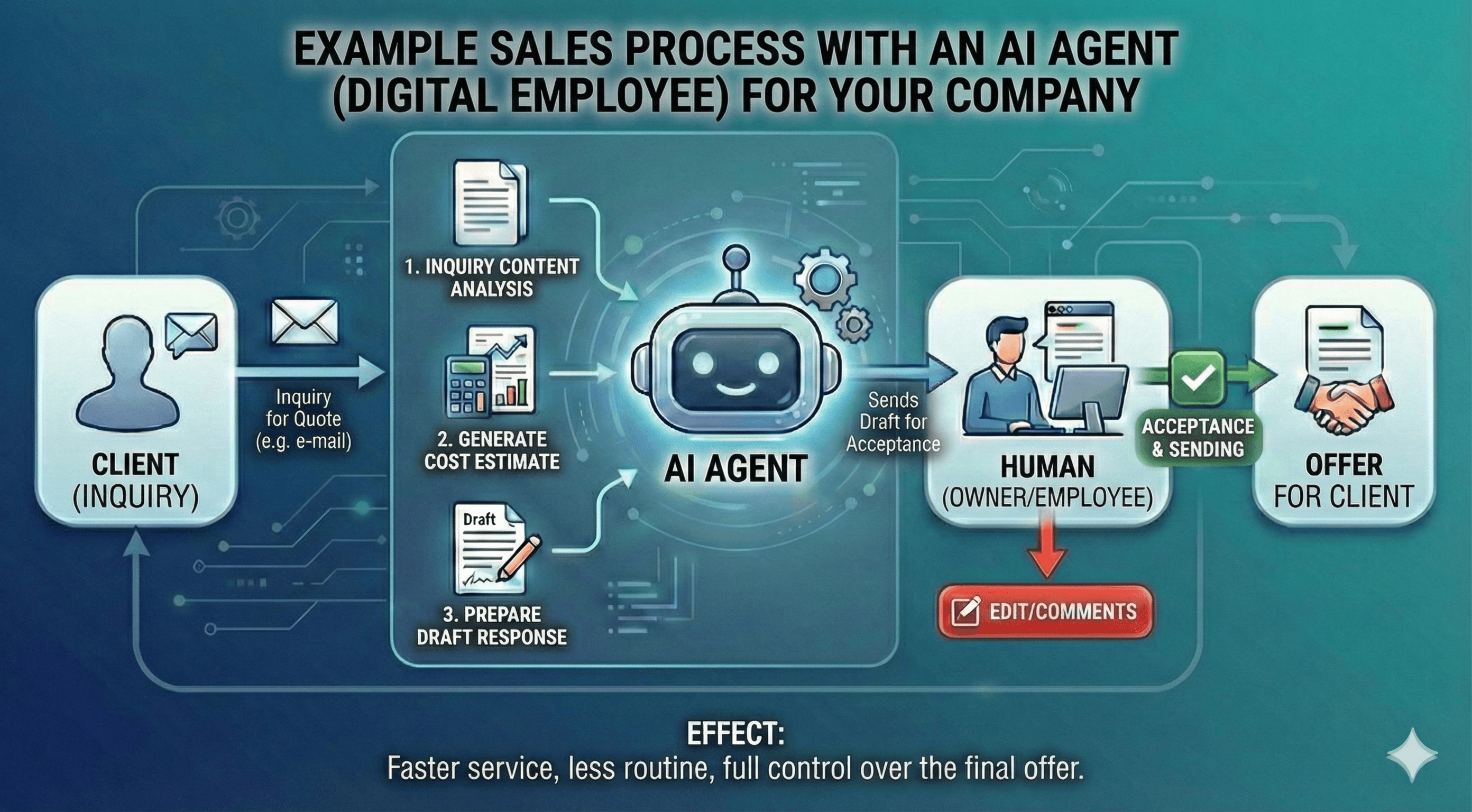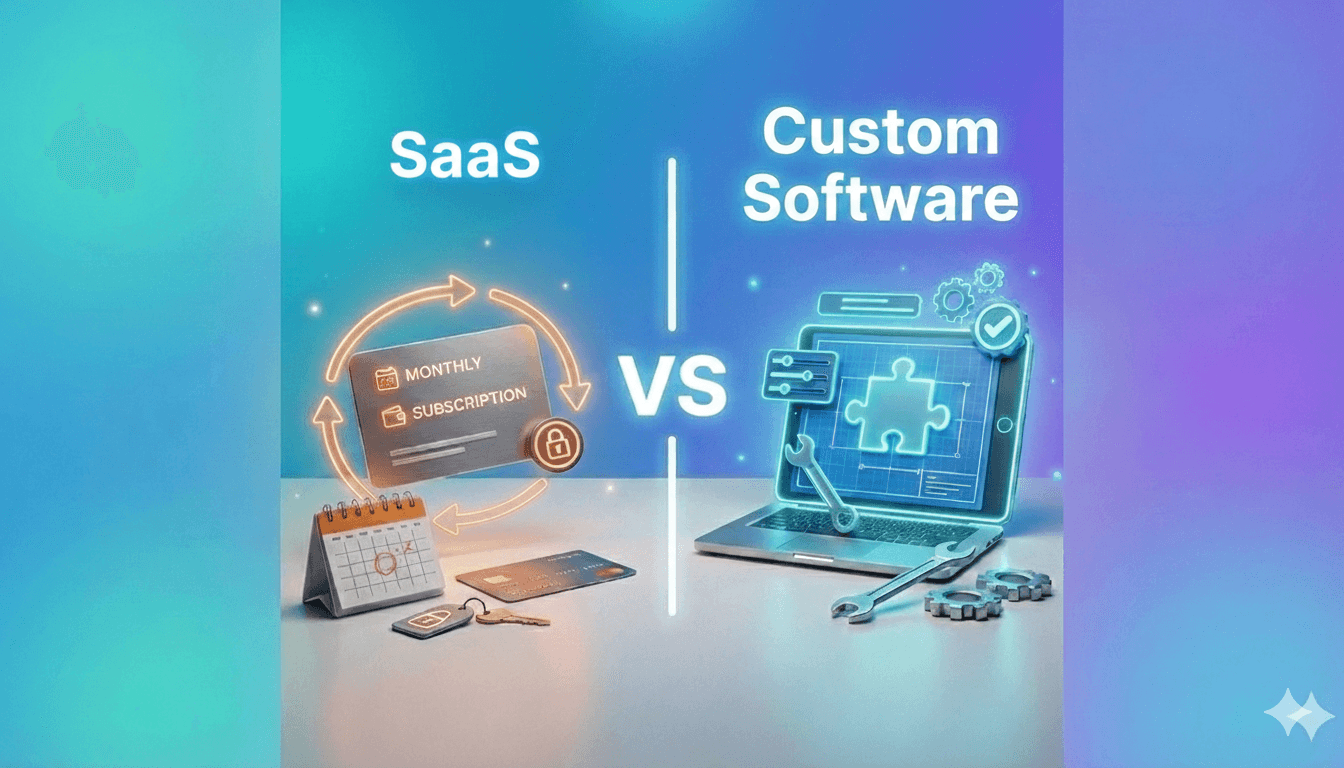What is an AI agent?
If you run a business, you probably know these situations:
There’s more and more work, but you don’t have the budget to hire new people
Customers call and message you and expect an instant reply
Reports, quotes, and orders are still created manually – and often contain mistakes
Your team has no time for strategic work because they’re stuck doing repetitive tasks
It is precisely in such situations that the need for an AI agent arises, a digital employee who supports a specific business process in your company. In simple terms, an AI agent is a program that uses artificial intelligence and can independently perform tasks and make decisions on behalf of a user or a company.
It’s not just a chatbot that replies to messages. An agent can:
understand the goal you give it,
plan what needs to be done,
use different tools (e.g. calendar, CRM, databases),
carry out the task and correct itself if something goes wrong.
It’s a step beyond a “simple” chatbot.

From chatbots to agents
In the beginning, we had a basic chatbot. How does a chatbot work? It:
A simple chatbot
In the beginning, we had a basic chatbot. How does a chatbot work? It:
waits for a question,
generates an answer based on the data it was trained on,
doesn’t see your data (e.g. calendar, CRM),
doesn’t do anything inside your systems – it only writes a reply.
If you ask such a chatbot: “When is my next meeting with the team?” it won’t answer, because it has no access to your calendar. AI in a specific process
The next step is using AI in a predefined process.
Example: we build a system where we say: “If the user asks about a meeting, first check the calendar, then generate a reply.”
So:
the user asks a question,
the system runs specific steps (e.g. a query to Google Calendar / Outlook),
AI only formulates a nice answer based on the fetched data.
This is often called an AI workflow - AI first “checks” something and only then responds.
The problem?
Such a process is rigid. What does “rigid” mean?
If we programmed: “Always check the calendar”, and the user suddenly asks: “What will the weather be like that day?”,
the system will still look into the calendar – because that’s how it was built. There is no real reasoning, only a fixed path.
AI agents – the next level
This is where AI agents come in.
Instead of a rigid path, we tell the AI agent: “This is your goal. Decide yourself how to get there.” An AI agent:
understands the problem,
plans on its own what to do,
chooses the tools it needs,
checks the results and adjusts the plan if necessary.
Business example:
“Prepare a sales summary for last month, send it by email to the board, and schedule a meeting if sales dropped by more than 10%.”
What will the AI agent do?
fetch data from the sales system,
calculate the changes,
generate a report,
send an email,
if needed – add a meeting to the calendar.
You don’t have to lead it by the hand step by step. The goal is enough.

How does an AI agent work – what is it made of?
For an agent to act like a “digital employee”, it needs several key components.
Goal understanding and step-by-step planning
An AI agent can break a problem into smaller parts and plan what it needs to do, step by step.
Example:
“How many 60 ml bottles of sunscreen should I take for 5 days in sunny Spain?”
The agent may decide it needs:
information on how many hours you’ll be in the sun per day,
recommendations on how much sunscreen is used per hour,
a simple calculation to convert this into the number of bottles,
possibly even your exact travel dates from the calendar.
This type of approach (“first think, then act”) is often called ReAct – from Reason + Act.
Access to the tools you use
An AI agent is not only a “brain”, but also “hands”.
It can call various tools:
databases,
an internet search engine,
calendar,
email system,
business applications (e.g. invoicing system),
other AI models, e.g. image recognition.
And – what’s important – it decides on its own when and what to use.
Thanks to this, it can for example:
check an order status in the system,
send a summary email to a client,
create tasks for an employee,
pull financial data from the accounting system.
Because of that, AI can actually do work.
Memory and learning over time
A good agent has memory – it doesn’t “forget everything” after a single conversation.
It can remember:
previous conversations,
user preferences,
tasks it has completed,
saved “reasoning notes” (its own “thought process”).
This means it:
doesn’t ask the same questions over and over again,
can continue a task after a break,
knows what you like, how you work, what kind of reports you prefer,
doesn’t repeatedly ask about the same things.
As a result, over time it becomes more and more tailored to your company.

Why does your company need an AI agent?
From a business owner’s perspective, the key question is: “What will this actually change in my company?”
Here are a few practical areas.
Sales and leads
An agent can:
analyse inquiries from forms and emails,
perform initial lead qualification,
prepare a draft offer,
remind salespeople to follow up.
Effect: fewer opportunities “get lost” along the way and the sales team has more time for real conversations with clients.
Customer support
An AI agent can:
answer repetitive questions,
use documentation and a knowledge base,
forward more complex cases to a human along with a summary.
Effect:
faster responses,
less switching between systems,
shorter handling time for tickets.
Documents and back office
An agent can help with document-related work, for example:
search for key fragments in contracts and procedures,
prepare summaries of long documents,
check documents.
Effect: less manual reading and copy-pasting, faster decisions.
Internal processes and reporting
In many companies, someone every week or month:
gathers data from several systems,
pastes it into Excel,
creates a chart,
writes a short summary.
An AI agent can:
fetch the data itself,
create reports,
add short conclusions,
send the final summaries to selected people.
Effect: time savings for managers and owners.
Will an AI agent replace people?
The point is not to “fire people and give everything to AI”.
In practice, AI agents work best as:
support for the team,
an executor of repetitive tasks,
a tool that prepares a “first draft” (offers, replies, reports).
The agent prepares a proposal and a person approves, corrects, or rejects it.
Where to start when building your own AI agent?
If you’re considering an AI agent for your company, you don’t have to start with a huge project. It’s better to do it step by step.
Choose one process One that:
is repetitive,
takes a lot of people’s time,
has a clear goal (e.g. faster customer responses, less manual work).
List the systems the agent would need to use For example: CRM, mailbox, calendar, documents, helpdesk.
Start with a pilot At the beginning, the agent can:
suggest answers,
prepare drafts,
work with a human “in the loop”.
Gradually give it more autonomy When you see that the results are good, the agent can:
handle simple matters on its own,
perform more steps without supervision.

Summary
An AI agent is no longer just a chatbot that “writes nice emails”.
It’s a digital coworker that:
understands the goal,
plans the steps,
uses your systems,
performs tasks,
improves based on the results.
From the company’s perspective, this means:
less manual, repetitive work,
higher team productivity,
faster customer service,
new opportunities for process automation.
If you are a business owner and wondering where to start, a good first step is:
choose one specific process,
describe it in a few sentences,
see what an agent that takes over part of your team’s tasks could look like.



